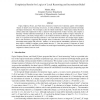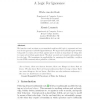156 search results - page 15 / 32 » Temporal Logics for Representing Agent Communication Protoco... |
TARK
2005
Springer
15 years 5 months ago
2005
Springer
Fagin, Halpern, Moses, and Vardi have proposed a framework of epistemic agents with multiple “frames of mind” (local-reasoning structures), to solve problems concerning incons...
CIA
2004
Springer
15 years 5 months ago
2004
Springer
Given a specification of communication rules in a multiagent system (in the form of protocols, ACL semantics, etc.), the question of how to design appropriate agents that can oper...
DALT
2003
Springer
15 years 5 months ago
2003
Springer
We introduce and motivate a non-standard multi-modal logic to represent and reason about ignorance in Multi-Agent Systems. We argue that in Multi-agent systems being able to reaso...
ENTCS
2007
15 years 8 days ago
2007
We define a logic EpCTL for reasoning about the evolution of probabilistic systems. System states correspond to probability distributions over classical states and the system evo...
125
click to vote
AAAI
2006
15 years 1 months ago
2006
Temporally extended goals (TEGs) refer to properties that must hold over intermediate and/or final states of a plan. The problem of planning with TEGs is of renewed interest becau...


